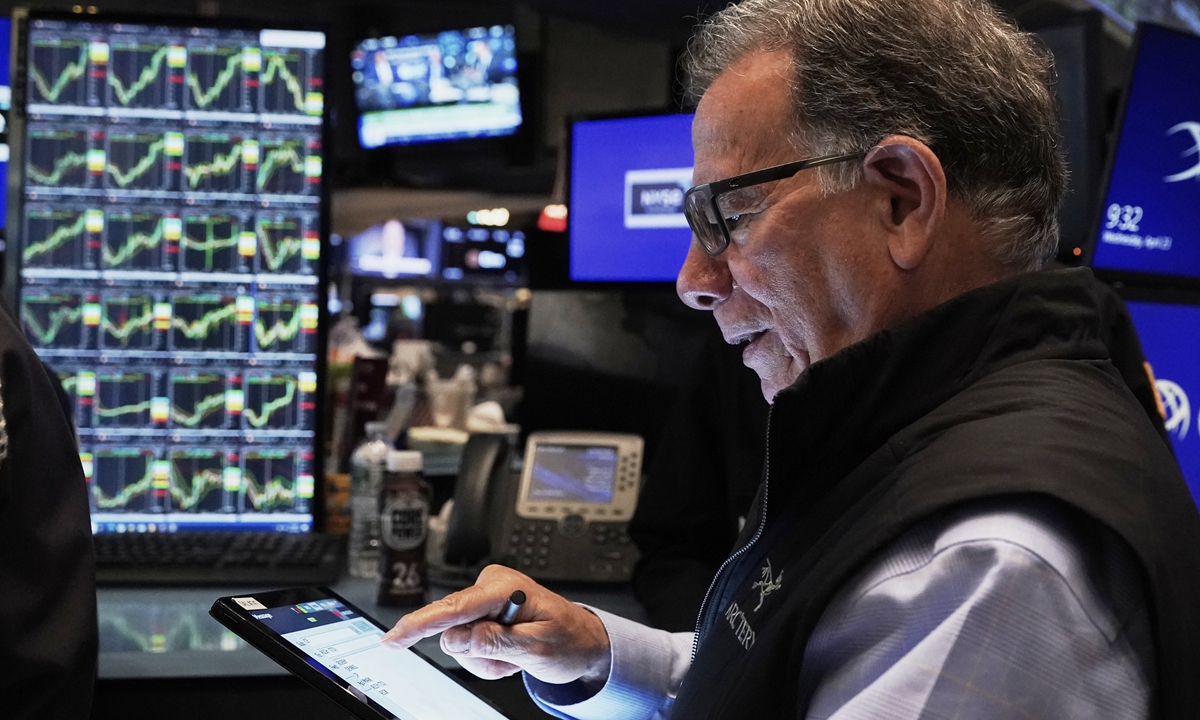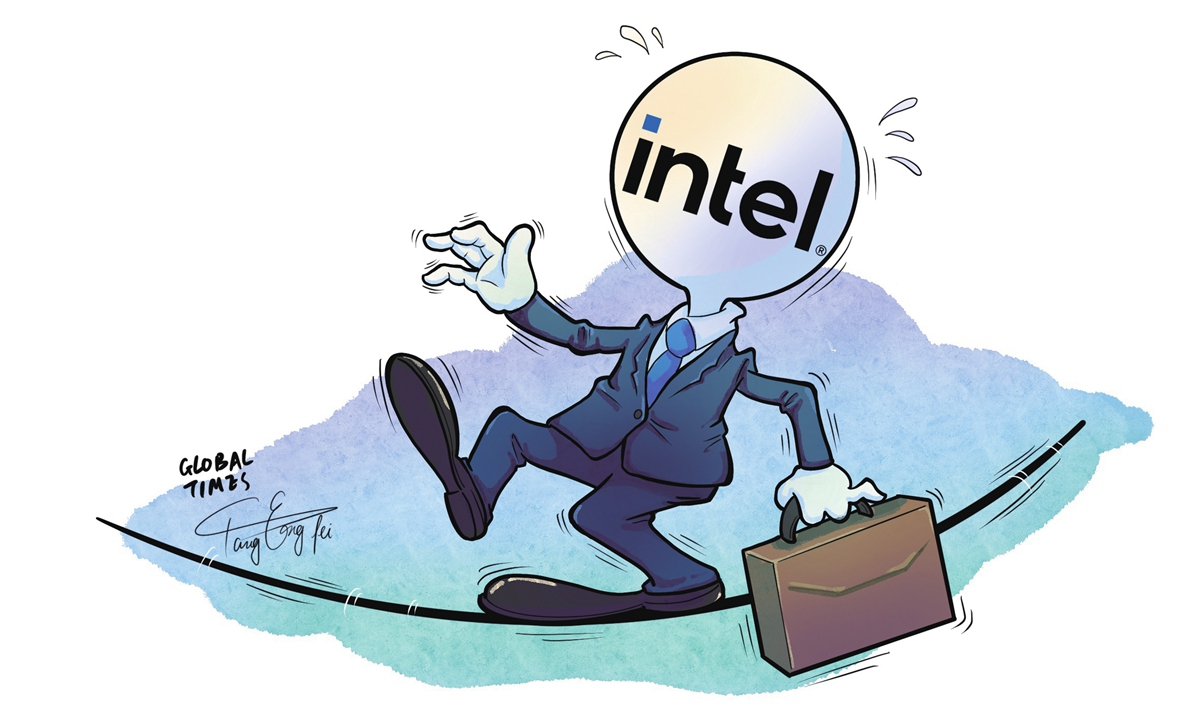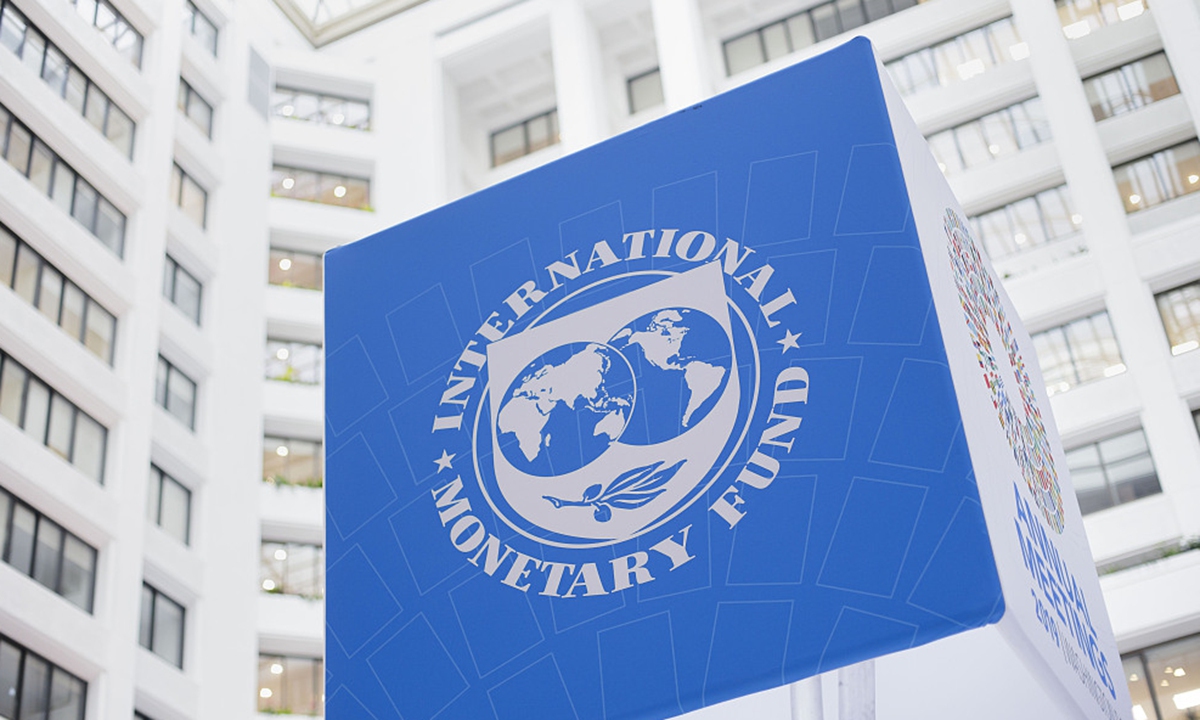US govt appears to soften tone on China tariffs; levy 'unsustainable'
If US truly wants a negotiated solution, it should stop threatening and blackmailing: FM

Trader Sal Suarino works on the floor of the New York Stock Exchange, Wednesday, April 23, 2025. Photo: VCG
US President Donald Trump has appeared to soften his recent comments on China. Speaking in the Oval Office on Tuesday, Trump said he was optimistic about improving trade relations with China, BBC reported.
The Trump administration is considering slashing its steep tariffs on Chinese imports - in some cases by more than half - in a bid to de-escalate tensions with Beijing that have roiled global trade and investment, according to people familiar with the matter. President Trump hasn't made a final determination, the people said, Wall Street Journal reported on Wednesday.
The US seemingly softening tone underscores that the US tariff policy has shown a significant discrepancy between its initial goals and the actual outcomes, Chinese expert said. However, they also pointed out that it isn't clear whether the latest remarks of US president will lead to concrete action. "So far, it is only a verbal expression," they emphasized.
US President Donald Trump said the 145 percent tariffs he imposed on Chinese imports will eventually "come down substantially" as he expressed optimism about future talks to reach a US-China trade deal, USA Today reported.
"145% is very high, and it won't be that high," US President told reporters in the Oval Office on Tuesday, USA Today reported. "No, it won't be anywhere near that high. It'll come down substantially. But it won't be zero ‒ used to be zero," he said.
"We have said from day one that tariff and trade wars have no winners, protectionism leads nowhere, and to decouple is to self-alienate," China's foreign ministry spokesperson Guo Jiakun said on Wednesday, at a regular press conference, on US saying it wants a deal with China.
Guo stressed that if a negotiated solution is truly what the US wants, it should stop threatening and blackmailing China and seek dialogue based on equality, respect and mutual benefit. To keep asking for a deal while exerting extreme pressure is not the right way to deal with China and simply will not work, Guo said.
Changing tone
US President Trump's remarks on China tariffs Tuesday came after Treasury Secretary Scott Bessent earlier in the day told a closed-door investor summit that the tariff standoff with China cannot be sustained by both sides and that the world's two largest economies will have to find ways to de-escalate, Bloomberg reported.
US stocks extend their rally on Wednesday, after rebound on Tuesday, powered by relief over trade tensions, US media reported.
The Dow Jones Industrial Average popped 926 points, or 2.3 percent. The S&P 500 climbed 2.8 percent, and the Nasdaq Composite rallied 3.6 percent, the CNBC reported on Wednesday.
US stock futures climbed on Wednesday, following Tuesday's rallies, with the Dow Jones Industrial Average futures rising 761 points, or 1.9. Futures tied to the S&P 500 popped 2.5 percent, while Nasdaq-100 futures added 2.9 percent, CNBC reported, noting that one drive behind the boost was that "the US president signaled tariffs on Chinese imports may go down."
"The US' seemingly softening tone underscores that the US tariff policy has shown a significant discrepancy between its actual outcomes and its initial goals," Bao Jianyun, dean and professor of the Department of International Politics, School of International studies at Renmin University of China, told the Global Times on Wednesday.
US stock and bond market fluctuations, along with growing domestic opposition from companies, economists and consumers, also add pressure on the US government to soften its hard stance on its steep tariffs, Bao said.
'Sincerity is needed'
Responding to another question about whether China is currently engaged in trade agreement negotiations with the US after the White House claimed that the US was "setting the stage for a deal with China on trade," Guo reiterated China's stance on US-initiated tariff war. "This tariff war is launched by the US. We have made it very clear that China does not look for a war, but neither are we afraid of it. If a negotiated solution is truly what the US wants, it should stop threatening and blackmailing China and seek dialogue based on equality, respect and mutual benefit."
Commenting on the changing tone of the Trump administration on tariff policy with China, Zhou Mi, a senior research fellow at the Chinese Academy of International Trade and Economic Cooperation, told the Global Times on Wednesday that "tariffs are not beneficial to any party and have already begun to show negative effects on the US itself."
"However, it isn't clear whether the latest remarks will lead to concrete action. So far, it is only a verbal expression, while the tariffs are already in place and creating real impacts," Zhou said.
If the Trump administration truly wants to show sincerity, it should make clear the mechanisms for reducing or removing tariffs, such as which department will take the lead, how the reductions will be implemented, and in which areas, Zhou further noted, adding that "in the end, what matters is not what is said, but what is done."
The latest remarks of the Trump administration are within expectations, indicating that it is beginning to realize that its tariffs cannot only hurt others without also harming the US itself, Lü Xiang, an expert on US studies and a research fellow at the Chinese Academy of Social Sciences, told the Global Times on Wednesday. "But we should not be too optimistic," Lü noted.
Bao also agreed that "Despite the US' seemingly softening tone, we should be cautious that it's only technical adjustment, while the US' goal of containing and suppressing China may not change." The US has damaged its credibility with its tariff moves, the expert said.
The US should show sincerity if it wants to resolve trade issues through dialogue, Bao said.


